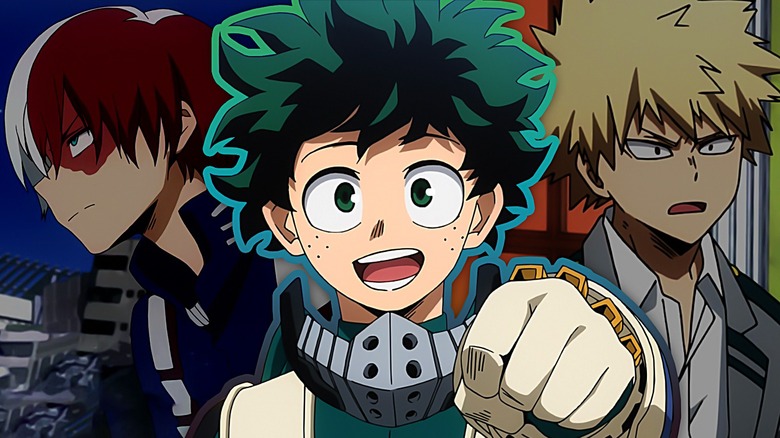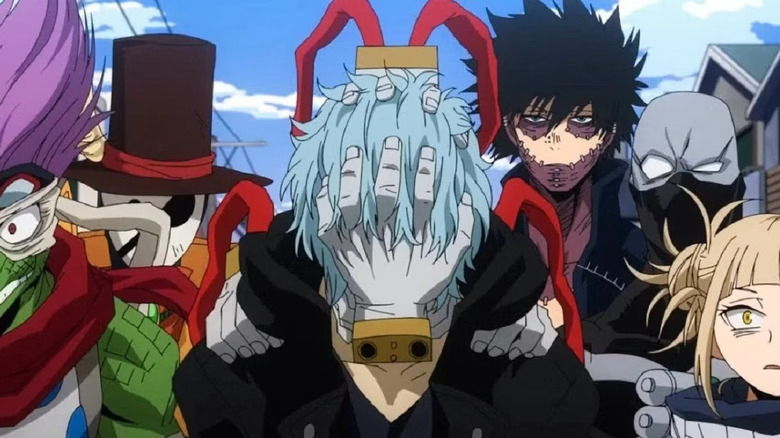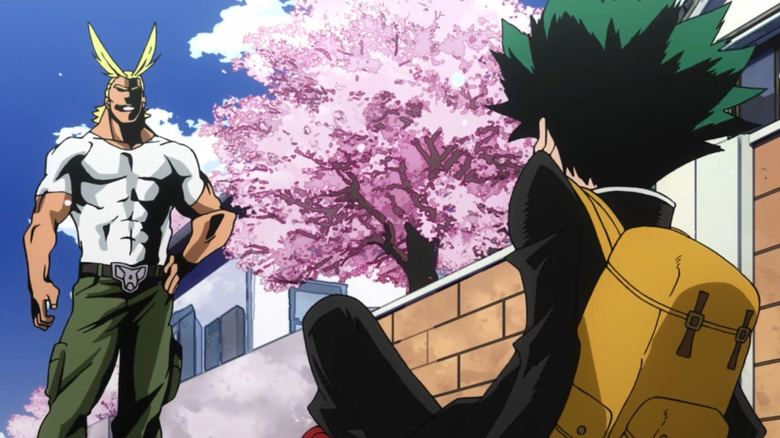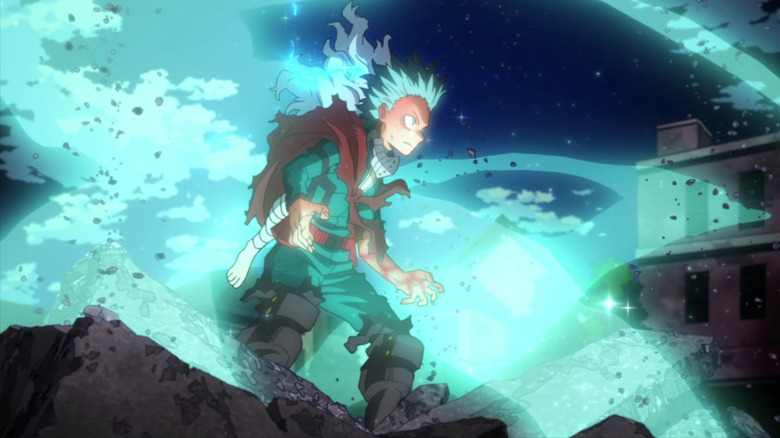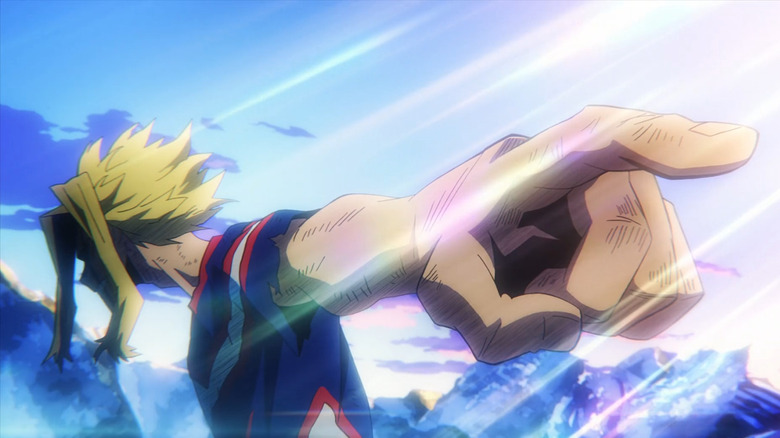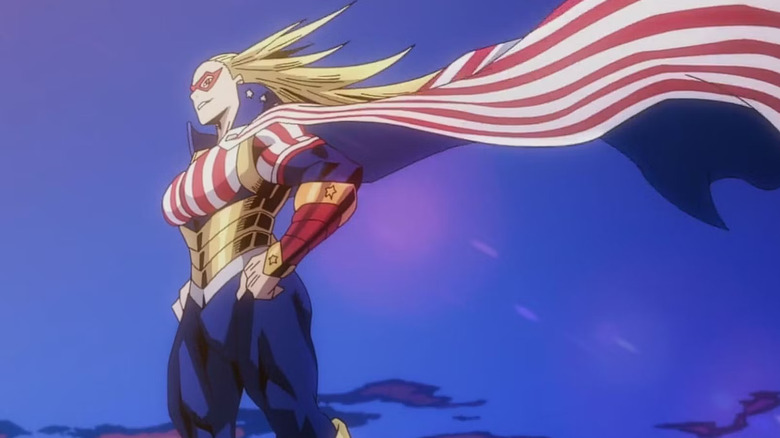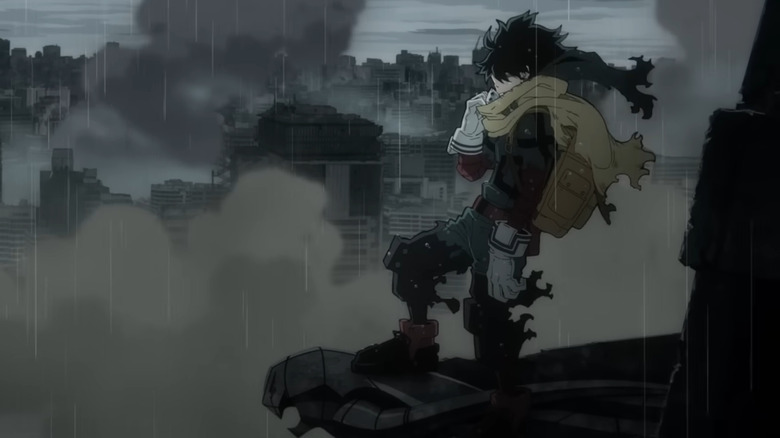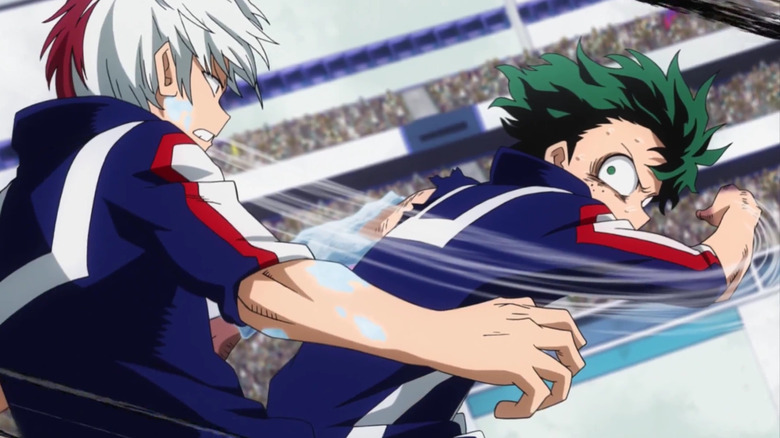Every Season Of My Hero Academia Ranked
"My Hero Academia" is one of the biggest anime currently airing, a unique show that is perfect for this superhero-obsessed era, while also acting as a cure for superhero fatigue. That's because the anime, based on Kohei Horikoshi's manga of the same name, takes on a familiar yet fresh approach to the genre.
Essentially "Sky High: The Anime," "My Hero Academia" takes place in a world where 80% of the population has some sort of superpower — some incredibly strong and cool, others mundane and kind of useless. With so many superpowered individuals, being a hero is a government-sanctioned profession you go to school to study for, which is what our protagonist Izuku Midoriya is hoping for when he enrolls in U.A. High School. The show follows the lives of the U.A. students as they learn what it means to be a hero, both in the classroom and in the real world because they get involved in increasingly more dangerous confrontations with a League of Villains that threatens superhuman society.
Before the live-action movie either follows most announced anime adaptations and quietly gets canceled or actually gets released, you should catch up on "My Hero Academia" as it approaches its climactic ending. While you should not skip any part of the story, it's worth preparing yourself for which seasons are full of highs and which ones have a few lulls. As with every TV show, there are some seasons of "My Hero Academia" that are simply better than others, so let's break them down.
7. Season 5
"My Hero Academia" is a rare show that starts out very promising and peaks early, then has a disastrous middle section before picking up steam again in its endgame. The show's absolute lowest point, its biggest dip in quality, came in season 5. A shame, since the main story arc of the season was highly praised by manga readers.
The season mainly covers three story arcs: the Joint Training Arc, the Meta Liberation Army Arc, and the Endeavor Agency Arc. The biggest problem with the season has to do with pacing, as the anime spends too much time on the Joint Training which, honestly, doesn't feel much different from the many previous school training arcs we already watched. Sure, there were some cool One For All lore drops, but not enough to salvage the arc. The biggest mistake, however, was the new arrangement of the Meta Liberation Army Arc (also known as the My Villain Academia Arc) and Endeavor Agency Arc, which meant the anime was left with too few episodes to cover these hugely important arcs. This resulted in a rush season that undermined some supposedly huge character and story moments.
Still, there are things to love about the season. The Todoroki family gets some very emotional moments as Endeavor's sins are explored, while Shigaraki begins his rise to power here with a deliciously dark subplot that impacts the rest of the story.
6. Season 1
There is plenty to like about "My Hero Academia" season 1. The reveal that All Might is really a frail, skinny dude who is constantly posturing and flexing for the public remains hilarious. The second episode's ending, that the story of this weak and powerless kid is actually a story of how he became the world's greatest hero, is compelling and makes it impossible to stop watching. The entire premise of a high school for superheroes makes this the closest we'll get to a "Sky High" sequel. Before the larger war between villains and heroes, before the bigger character story arcs and development, there was just this rather fun and entertaining superhero coming-of-age tale that remains effective.
But it also feels much smaller, and in some ways like a standard action shonen. While the themes of friendship remain at the core of "My Hero Academia" to this day, they are most prominent and also most reminiscent of other anime in this first season — which is in many ways just "Naruto" but with superheroes. The show hadn't quite found its voice yet, but there are plenty of glimpses of the greatness to come. Plus, the raid on the school toward the end of the season is unexpected and full of thrilling moments.
5. Season 4
"My Hero Academia" season 4 is kind of a transition period for the show, as it continues to explore the ramifications of All Might's retirement. The season's big story arcs are the Shie Hassaikai Arc (aka the one with the fight against Overhaul that technically began the previous season), and the U.A. School Festival Arc (with the musical performance). This means that, tonally, it is a little bit all over the place, same as season 3. Both seasons have a dark, thrilling fight against a supervillain, followed by a less-than-thrilling school-focused arc.
What saves this season and makes it a memorable one is that both halves have big highs. The School Festival Arc is not just a cute excuse for some downtime, but it is specifically framed as Midoriya and his classmates wanting to cheer each other up after back-to-back-to-back attacks from supervillains. It is also all about Midoriya wanting to make Eri smile after a lifetime of horrors — showing that being a hero is more than punching villains in the face. This culminates in the emotionally charged musical performance that highlights every main character in Class 1-A, plus a very catchy song. Oh, and Gentle Criminal is also a memorable and fun villain.
But before that, we get the Overhaul arc, which is full of memorable moments, thrilling fights and emotional devastation. It is this season that gives us the very first character death of the show. It is this arc that introduces U.A.'s big three, and then takes one of them away in a poignant way. This season has two of the five best episodes of the entire show, according to us, so that must count for something.
4. Season 3
While season 3 of "My Hero Academia" is not the best overall season of the anime due to a weaker second half, it has the absolute best moment in the entire story. Every major anime has that moment when the mentor has a big fight and is defeated — a moment that signifies the turning point in the story as it gets darker, the passing of the torch from the old generation to the new one. It's Whitebeard's big fight on Marineford in "One Piece," Kakashi's fight against Pain in "Naruto," or Gojo's role in the Shibuya Incident Arc of "Jujutsu Kaisen."
For "My Hero Academia," that moment– and the show's peak — comes in episode 49, "One For All," as All Might faces off against All For One and delivers the coolest superhero punch ever put on screen: the United States of Smash. It's like seeing Japanese Superman defeat Japanese Darth Vader through the power of democracy and badassery, and one of the best build-ups and executions in the entire show.
And that is just one episode in the season! Before that, we also get the Forest Training Camp Arc where Midoriya fights Muscular, a brutal, gnarly, and envigorating fight where Midoriya shows himself to be a hero as he pushes himself to the very limit to save a little boy (and even does his own Detroit Smash). There's also the Midoriya vs Bakugo fight, one of the most emotional moments of the show as the two enemies-turned-friends fight out their differences and confront their past — kickstarting Bakugo's redemption arc.
3. Season 7
"My Hero Academia" season 7 has not yet finished by the time of writing this list, but it has already proven itself to be one of the best seasons we've seen of the show. We started things off strongly with the introduction of Star and Stripe, America's number one hero, who made one hell of a first impression during a dynamic, high-stakes, brutal fight against Shigaraki. Then we pay off one of the long-standing mysteries of the show in the school traitor arc that led to some emotional resolutions and confrontations. But after that business is over, the show kicked into high gear and headed straight into the appropriately titled Final War Arc.
What makes the Final War stand out is that we not only get an "Avengers: Endgame" style final battle with virtually every surviving character we know involved, but it also serves as the culmination of many character arcs and stories, many of them years in the making. Todoroki finally confronts Dabi and they air out their family grievances in a beautifully animated fight scene that echoes the best scene in all of "Avatar: The Last Airbender." And we also get the culmination of Bakugo's redemption arc, the best one in animation since Zuko's (not to keep comparing this show to "Avatar: The Last Airbender"), with an emotionally charged episode that brings Midoriya's friend-turned-bully-turned-rival-turned-right-hand-man full circle. We still have a little while to go, but this season is getting us closer and closer to the ending, and so far it's nailing it.
2. Season 6
If season 7 of "My Hero Academia" is its "Endgame," then season 6 was its "Infinity War." This is by far the darkest chapter of the story, as it kickstarts the all-out war between heroes and villains. After a rather disappointing fifth season, this is the season that made "My Hero Academia" a must-watch anime once again, bringing back virtually every character we knew for the final operation all before hell broke loose. Moreso than other seasons, this one is neatly divided in two halves. The first half of the season adapts the Paranormal Liberation War Arc of the manga, and the attempt to stop Shigaraki and his army of villains before they wreak havoc on the world. The stakes are as high as they can get. Heroes die, villains are born, and evey episode builds on the previous one as the very fabric of the world of the show changes forever. No one is safe, there are consequences, and it is also just a pleasure to watch.
Then, the second half brings the Dark Hero Arc to life, briefly turning "My Hero Academia" into anime Batman (with some Spider-Man thrown in for good measure). This sees Midoriya at his lowest and darkest point, becoming a lone vigilante as hero society crumbles and the public loses all faith in their heroes. We get some all-time great moments from Midoriya as well as Bakugo, plus some fascinating plays on the superhero genre as we see what happens to society when villains win. It's dark, it's action-packed, it's emotional. It's the culmination and perfection of every idea "My Hero Academia" introduces.
1. Season 2
Here it is, the absolute best season of "My Hero Academia." It's not that the show peaked early, it's just that the second season has such a good balance of heart, character, story, and worldbuilding that no other season manages to match. What makes this season special is it's where the show's concept of a high school of superheroes works best. We start with the Sports Festival Arc — essentially a giant tournament — that showcases how a high school for heroes would work, while also giving us some of the best fights in the entire series, like the Todoroki vs Midoriya fight, which remains one of the best scenes of the past decade thanks to Yutaka Nakamura's animation. Then we get the fight against Hero Killer Stain, our first brush with morally grey characters in this universe and a villain who acts not out of greed or sheer evil, but disillusionment in hero society — a theme that permeates throughout this day — and a character that remains one of the show's finest.
Even the Final Exams Arc works as the follow-up to the Vs. Hero Killer Arc, because it's not just about the shock of returning to school after a brush with the dangers of the real world, but also a shocking test that saw Midoriya and Bakugo forced to work together to fight their idol, All Might. This is the season where the anime found its voice, where the characters began to be fleshed out and the worldbuilding became more nuanced and unique even among other superhero stories. It is the best follow up to a debut season you could ask for, and the pinnacle of what "My Hero Academia" can do as a superhero anime.
